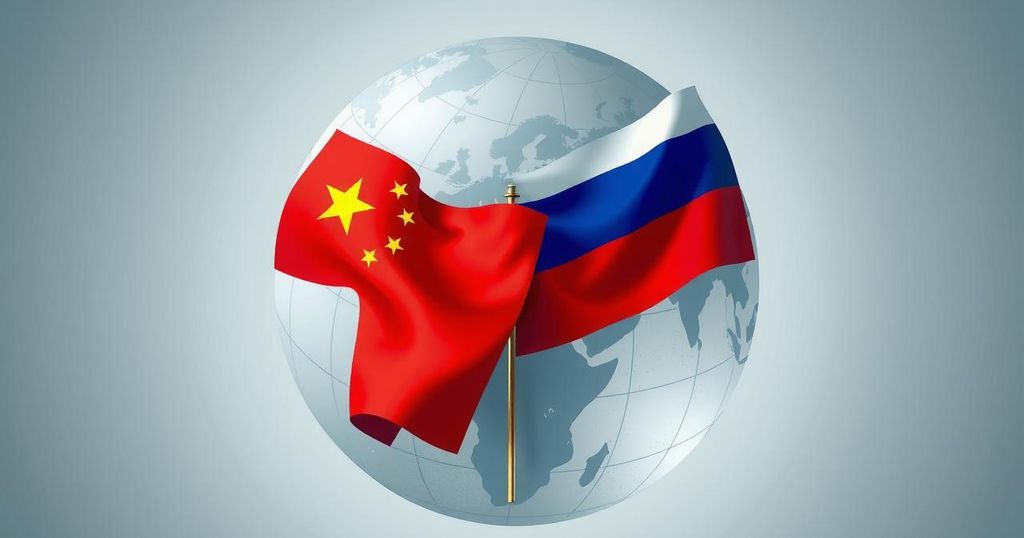China is closely observing Trump’s Ukraine strategy while strengthening its ties with Russia. Chinese officials claim a neutral role in the conflict and aim to position themselves as a strategic partner for Ukraine. Recent U.S.-Russia talks raise concerns about potential shifts in geopolitical dynamics, particularly affecting China’s influence as it navigates its relationship with both Russia and Ukraine.
China is strategically analyzing U.S. President Donald Trump’s approach to resolve the ongoing conflict in Ukraine while reinforcing its strong ties with Russia. Authorities in Beijing are positioning themselves as a potential partner for Ukraine, balancing this relationship with an existing no-limits partnership with Russia, as reported by experts and former officials. Recent diplomatic interactions highlight China’s careful navigation of international dynamics involving both Ukraine and Russia.
British Prime Minister Keir Starmer and French President Emmanuel Macron are scheduled for discussions in Washington this week, following significant talks between U.S. and Russian officials in Riyadh. Trump’s meeting with Macron at the White House lasted almost two hours, discussing Ukraine alongside other G7 leaders via video conferencing.
Meanwhile, Chinese President Xi Jinping held a conversation with Russian President Vladimir Putin, who briefed him on the discussions in Riyadh. The Chinese government expresses support for Russia’s efforts in what it refers to as the ‘crisis’ rather than the ‘war,’ which has been ongoing for three years since Russia’s invasion of Ukraine.
Chinese officials consistently emphasize their desire to maintain a constructive role in facilitating a political resolution and have refrained from recognizing Ukraine’s sovereignty in discussions. Foreign Minister Wang Yi reiterated that China sees itself as Ukraine’s largest trading partner and seeks to foster peace negotiations between the involved parties, promoting constructive dialogue over direct negotiations.
U.S. Secretary of State Marco Rubio clarified that recent talks between Washington and Moscow aimed to establish communication lines rather than negotiate a concrete deal concerning Ukraine. These discussions were interpreted as steps towards reestablishing relations without sidelining Ukraine’s interests.
Beijing appears anxious about a potential thaw in U.S.-Russia relations, particularly if sanctions against Russia are lifted—this could reduce Moscow’s reliance on China. Analysts argue that while no complete reconciliation seems imminent, any signs of closer ties could impact Beijing’s geopolitical strategy.
Experts warn the U.S. risks bolstering China’s narrative about American reliability, advising that swift diplomatic engagements with Russia could contradict the U.S. position in the ongoing conflict. Observers believe that any concessions may provide China with leverage in its global campaign against the U.S.
Retired Admiral Mark Montgomery noted that the U.S. may be losing its negotiating power by engaging in talks too early, thus inadvertently benefitting Chinese positions globally. As Xi and Putin coordinate future visits, the potential for increased Chinese influence amidst the conflict remains a topic of concern among U.S. officials.
Skepticism exists among former U.S. officials regarding China’s willingness to genuinely aid in ending Russia’s aggressive actions in Ukraine. They suggest that China might leverage the situation to gain favor with Trump while primarily focusing on its own economic interests in the region.
In summary, China is carefully analyzing U.S. diplomatic strategies concerning Ukraine while reinforcing its connections with Russia. As it positions itself in the geopolitical landscape, experts express concern about the implications of U.S.-Russia communications on China’s role and influence, particularly regarding the delicate balance between supporting Ukraine and maintaining strong ties with Moscow. The ongoing situation highlights the complex dynamics at play and raises questions about the reliability of U.S. alliances.
Original Source: www.voanews.com






